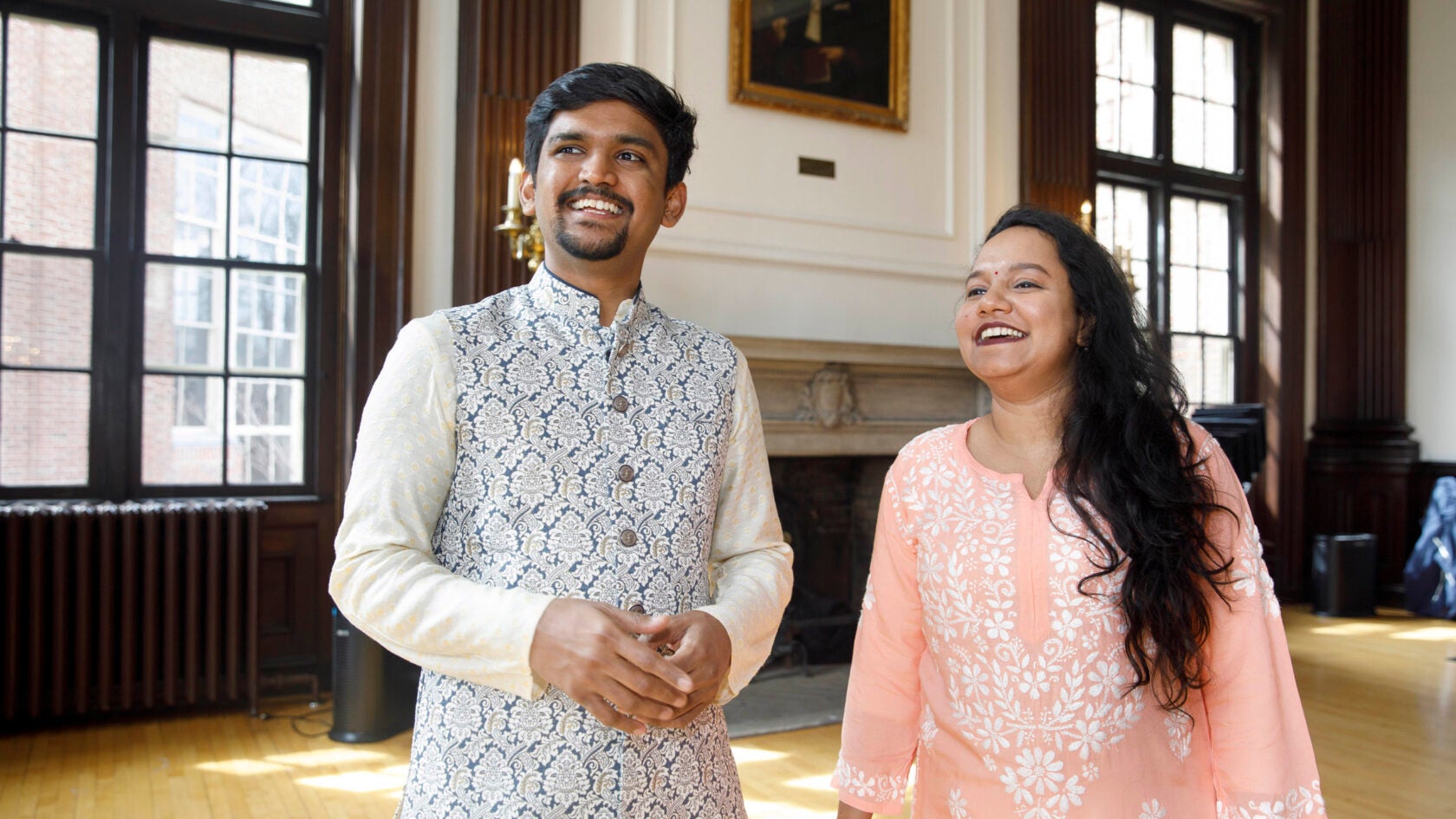When your soulmate’s a classmate
Husband and wife — both pursuing master’s degrees at Harvard — merge love for education to help students in India

Kris Snibbe/Harvard Staff Photographer
Part of the Commencement 2024 series
A collection of stories covering Harvard University’s 373rd Commencement.
Alria and Vyankatesh Kharage met as undergraduates in Mumbai University, fell in love, and began building a life together when their shared passion for education brought them to Harvard.
The Kharages are both pursuing their master’s degrees in education at the Harvard Graduate School of Education — Alria in the Education Leadership, Organizations, and Entrepreneurship program and Vyankatesh in the Learning Design, Innovation, and Technology program. It’s rare that married couples attend graduate programs together due to the complexities of School admissions. To highlight their unique status, the Ed School made them the subject of a Valentine’s reel on Instagram.
Recently in the Gutman Building, the Kharages, who married three years ago, reminisced about their time together at the Ed School as soulmates and study partners, sharing household chores, and even seeing snow for the first time.
Alria Kharage
“It’s been a beautiful year. There are many remarkable things we have experienced together, and because we are in the same School, we can understand what the other one is going through. And I love that I have a permanent study buddy.”
“Living together and working together has been double the joy,” said Vyankatesh.
“It’s been a beautiful year,” said Alria. “There are many remarkable things we have experienced together, and because we are in the same School, we can understand what the other one is going through. And I love that I have a permanent study buddy.”
The Kharages found their calling for education before they found each other. Alria’s focus stems from the story of her mother, who halted education in the 10th grade but worked her way up to a high administrative position at a university.
“My mother has been instrumental in shaping my love and dedication for education,” said Alria, who is an Adrian Cheng Fellow in the Social Innovation Change Initiative at Harvard Kennedy School. “My educational journey would have been incomplete without her inspiration.”
After college, Alria worked for an IT firm in Mumbai and felt unfulfilled. That changed when she tried a two-year stint at Teach for India, an organization inspired by Teach for America.
“I was working with students in Grade 10, which is the most pivotal grade in the Indian education system because you must decide what you want to do next. Do two more years of secondary school and then go to college, or stop at 10th grade and get a job,” said Alria. “That experience transformed me. I wanted my students to know there were opportunities for them to continue their education.”
Meanwhile, Vyankatesh, the son of a civil service officer, moved around a lot and attended eight different schools. He initially set out to become an athlete and teach sports to children. After that didn’t work out, he took a job in finance. Realizing he liked working with children, he began exploring job opportunities in education. He soon learned that rather than being a classroom teacher, his interest was in designing programs. He traveled across India to learn about different education systems, including Buddhist monasteries.
“I wanted to understand the Buddhist way of learning,” he said. “When I visited Buddhist monasteries, that is when I realized I wanted to work in the education space and find a way to offer a holistic education to students.”
During the pandemic, the couple drew on their experiences to launch the Asude Foundation, a nonprofit that offers programs in career awareness and life skills to 9th- and 10th-graders from low-income households in India. Over three years, the organization’s reach grew from four to 72 schools, helping nearly 15,000 students, but the Kharages’ dream is to help many more.
Their venture is a semifinalist in the Social Impact category of the Harvard iLab’s President’s Innovation Challenge.
Karen Brennan, faculty co-chair of Vyankatesh’s master’s program, said the soon-to-be-graduate fits all the requirements to be a stellar educator.
“Vyankatesh is an exemplary learner and an exceptional member of our community: curious and creative about the expansive possibilities afforded in learning, humble and persistent in the face of challenges, and generous and kind as a peer and colleague,” said Brennan, Timothy E. Wirth Professor of Practice in Learning Technologies, in an email.
Alria has traits that set her apart from her peers — pragmatism, gratitude, a sense of wonder, and a spirit of supporting others — according to Ebony N. Bridwell-Mitchell, Herbert A. Simon Professor in Education, Management, and Organizational Behavior at the Ed School.
“These are the students who you know will not only go on to impact the world in important ways but students who will do so navigating the world in the way that provides a model for other people to become the best versions of themselves — creating a multiplier effect on the impact they have in the world,” said Bridwell-Mitchell, chair of Alria’s master’s program.
After graduation, the Kharages will return to India and their foundation. For Alria, it is a way to help young students to have the opportunities her mother didn’t have.
Vyankatesh shares the sentiment. “I see privilege as a blessing and as a responsibility. My family comes from very humble backgrounds, and my parents and grandparents did the hard work to give me better opportunities in life. My responsibility is to take it forward and bring it to people who didn’t have the same opportunities that I had.”










